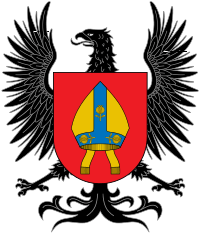Episcopal Conference of Colombia
The Episcopal Conference of Colombia is an administrative institution and permanence of the Catholic Church, composed of all the bishops of the dioceses of Colombia in a college, in communion with the Roman Pontiff and under his authority to exercise set of certain pastoral functions of the episcopate on the faithful of their territory under the rule of law and statutes, in order to promote the life of the Church, to strengthen its mission of evangelization and respond more effectively to the greater good that the Church should seek to men.

Ecclesiastical Organization
The Catholic Church is present in 13 locations with groundwater, 52 suffragan dioceses, 10 apostolic vicariate 1 and Military Ordinary:
The Archdiocese of Barranquilla is suffragan dioceses of The Tour Santa Marta and Valledupar Riohacha
The Archdiocese of Bogotá has as suffragan dioceses of Engativá Facatativá Fontibón Soacha and Zipaquirá Girardot
The Archdiocese of Bucaramanga is suffragan diocese of Barrancabermeja Malaga Soatá Socorro and San Gil and Velez
The Archdiocese of Cali diocese is suffragan of Carthage and Palmyra Buga Buenaventura
The Archdiocese of Cartagena is Magangué suffragan dioceses of Monteria and Sincelejo Montelibano
The Archdiocese of Ibague is suffragan dioceses of Florence Garzón Lebanon Cord-Honda and Neiva
The Archdiocese of Manizales has the suffragan dioceses of La Dorada-Guaduas Armenia and Pereira
The Archdiocese of Medellín has the suffragan dioceses of Caldas Girardota Jericho and Sonson-Rionegro
The Archdiocese of New Pamplona diocese is suffragan of Ocana and Cucuta Tibú Arauca
The Archdiocese of Popayan is suffragan dioceses of Ipiales Mocoa Sibundoy meals and Tumaco
The Archdiocese of Santa Fe de Antioquia is suffragan diocese of Apartado Tado-Istmina Quibdó and Santa Rosa de Osos
The Archdiocese of Tunja is suffragan dioceses of Chiquinquirá Duitama-Sogamoso Garagoa and Yopal
The Archdiocese of Villavicencio is suffragan dioceses of Colombia Granada and San Jose del Guaviare
The Vicariate Apostolic of Guapi, Inirida, Leticia, Mitu Puerto Carreno Puerto Gaitan, San Andres and Providencia, San Vicente, Puerto Leguizamo, Tierradentro and Trinidad are immediately subject to the Holy See
The Military Ordinary in Colombia
Apostolic Nuncio
In the 19th century was established Apostolic Delegation in Colombia. In May 8, 1916 became the apostolic Internunciature. July 20, 1917 was elevated to the rank of Apostolic Nuncio. Nunzio is the seat of the capital of Bogota.
Episcopal Conference
Colombian Bishops, is the Conference of the Episcopal Conferences of Colombia (Episcopal Conference of Colombia, CCA). The ECC was established following the invitation of Pope Leo XIII, who in 1899 had suggested to the local churches to meet at conferences in southern U.S. bishops to reorganize and revitalize the Church in Latin America. Fifteen Colombian bishops meet for the first time on September 14, 1908 in Bogota, chaired by Archbishop Bernardo Herrera Restrepo was the second meeting of the bishops of Latin Americans, after the one held in Mexico City by Mexican Bishops in 1900. Two documents were signed collectively: the first focuses on the defense of priests and religious who are victims of the attacks the Masons, the second is a call to Christian life and its obligations, and an invocation to harmony and peace. At this first meeting, the ECC decided to meet regularly every three years, so that from 1908 to 1965 (the end of the Second Vatican Council held 21 plenary meetings. During assembly of 1951 was of Colombia established the Permanent Secretariat Bishops, the governing body of the various committees that divide the CEC. With the Second Vatican Council of the CEC, in light of the conciliar documents, at best clarifies the nature of 'conference' of the bishops' and perfected the organization of the Permanent Secretariat. The purpose of the ECC is the study and adoption of these common tools, in accordance with Canon Law, allow coordination of the exercise of the pastoral care of the Colombian Catholic Church (section 1 of the statutes of the ECC). The Conference is composed of a president, a Secretariat and the General Assembly plenary rights and that this form of episcopal commissions of 15 and 11 departments that touch all aspects of church life and social development. The CCA is a member of the Latin American Episcopal Council (CELAM).
Presidents
| No. | President | See | Term |
|---|---|---|---|
| 1 | Bernardo Herrera Restrepo | Bogotá | 1908 – 1928 |
| 2 | Ismael Perdomo Borrero | Bogotá | 1928 – 1950 |
| 3 | Crisanto Luque Sánchez | Bogotá | 1950 – 1959 |
| 4 | Luis Concha Córdoba | Bogotá | 1959 – 1964 |
| 5 | Aníbal Muñoz Duque | Nueva Pamplona
Bogotá |
1964 – 1972 |
| 6 | José de Jesús Pimiento Rodríguez | Garzón | 1972 – 1978 |
| 7 | Mario Revollo Bravo | Nueva Pamplona | 1978 – 1984 |
| 8 | Héctor Rueda Hernández | Bucaramanga | 1984 – 1987 |
| 9 | Alfonso López Trujillo | Medellín | 1987 – 1990 |
| 10 | Pedro Rubiano Sáenz | Cali
Bogotá |
1990 – 1996 |
| 11 | Alberto Giraldo Jaramillo | Popayán
Medellín |
1996 – 2002 |
| 12 | Pedro Rubiano Sáenz | Bogotá | 2002 – 2005 |
| 13 | Luis Augusto Castro Quiroga | Tunja | 2005 – 2008 |
| 14 | Rubén Salazar Gómez | Barranquilla
Bogotá |
2008 – 2014 |
| 15 | Luis Augusto Castro Quiroga | Tunja | 2014 – 2017 |
| 16 | Oscar Urbina Ortega | Villavicencio | 2017 – |